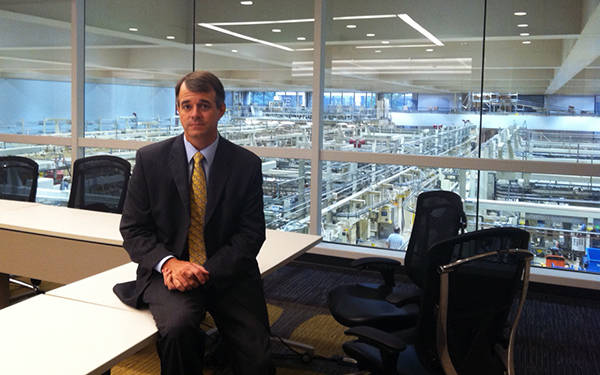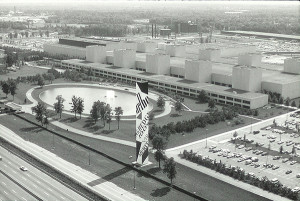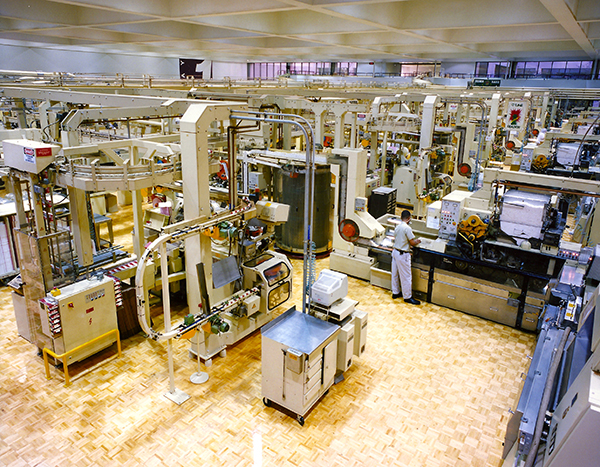Richmond likes to be known as the River City, but Philip Morris USA’s massive manufacturing center just south of downtown could win the nickname Cigarette City.
The manufacturing center – or MC, as the company calls it — is celebrating its 40th birthday, and the tobacco giant opened its gates Thursday to give reporters a peek at how it produces what amounts to half of all cigarettes sold in the United States.
Cameras were prohibited in the production area to prevent competitors from seeing the plant’s operations. What lenses would have captured was 20,000 cigarettes being produced per minute in Philip Morris’s “super high speed” production bays. Cigarettes speed so quickly through the process that they are but a blur as they pass.
The nearly 2 million-square-foot facility sits on 200 acres at 3601 Commerce Road. It runs 24 hours a day, five days a week, with about 2,000 employees, said production manager Kevin Weaver. The end result is 600 million cigarettes produced and packaged per day.
The major subsidiary of West End-based Altria Group, Philip Morris produces 176 different types of cigarettes under various brands.
Marlboro is its lead brand by far, accounting for 40 percent of all cigarettes sold in the United States, the company said. Marlboro Gold cigarettes are the biggest seller.
The company has put more than $200 million in upgrades and maintenance into the MC over the past few years and is in hiring mode at the facility.
That growth comes amid pressure on the cigarette industry from new regulations and changing habits. Consumption of cigarettes is in decline, but the market for smokeless tobacco and nicotine products continues to grow.
Electronic cigarettes and other smokeless products are new sources of potential revenue for the company, said Billy Gifford, president and CEO of Philip Morris USA.
The company is testing a product called Verve, a polymer disk containing tobacco-derived nicotine.
“We see it as an opportunity,” Gifford said Thursday of smokeless products.
Still, 75 percent of Altria’s profits come from products that are meant to be smoked: cigarettes and cigars. Altria’s second quarter earnings were $1.27 billion, from revenue of $4.5 billion.
Richmond likes to be known as the River City, but Philip Morris USA’s massive manufacturing center just south of downtown could win the nickname Cigarette City.
The manufacturing center – or MC, as the company calls it — is celebrating its 40th birthday, and the tobacco giant opened its gates Thursday to give reporters a peek at how it produces what amounts to half of all cigarettes sold in the United States.
Cameras were prohibited in the production area to prevent competitors from seeing the plant’s operations. What lenses would have captured was 20,000 cigarettes being produced per minute in Philip Morris’s “super high speed” production bays. Cigarettes speed so quickly through the process that they are but a blur as they pass.
The nearly 2 million-square-foot facility sits on 200 acres at 3601 Commerce Road. It runs 24 hours a day, five days a week, with about 2,000 employees, said production manager Kevin Weaver. The end result is 600 million cigarettes produced and packaged per day.
The major subsidiary of West End-based Altria Group, Philip Morris produces 176 different types of cigarettes under various brands.
Marlboro is its lead brand by far, accounting for 40 percent of all cigarettes sold in the United States, the company said. Marlboro Gold cigarettes are the biggest seller.
The company has put more than $200 million in upgrades and maintenance into the MC over the past few years and is in hiring mode at the facility.
That growth comes amid pressure on the cigarette industry from new regulations and changing habits. Consumption of cigarettes is in decline, but the market for smokeless tobacco and nicotine products continues to grow.
Electronic cigarettes and other smokeless products are new sources of potential revenue for the company, said Billy Gifford, president and CEO of Philip Morris USA.
The company is testing a product called Verve, a polymer disk containing tobacco-derived nicotine.
“We see it as an opportunity,” Gifford said Thursday of smokeless products.
Still, 75 percent of Altria’s profits come from products that are meant to be smoked: cigarettes and cigars. Altria’s second quarter earnings were $1.27 billion, from revenue of $4.5 billion.






Great place, great people. I enjoyed my 18 years with the team at Philip Morris.
600 million cigarettes per day — impressive!
That works out to 750 customers killed per day.
It’s about 40,000 packs per death. Naturally those packs made that day didn’t cause the deaths that occurred that same day, but over time it’s accurate to say that 40,000 packs cause one death.
So every day this facility operates, 750 customers die as a direct result.
Laurel Park. Gone in one day. Keysville: next day. Sherando: the day after that.
Very interesting indeed. My mother-in-law is from Keysville.
Jon, I’ll grant you your overall point. Smoking kills people. It’s not just death cigarettes bring to humankind, but sometimes it’s just an awful lingering sickness that drains both the soul and pocketbooks of individuals who smoke but often also their families and anyone who cares for them. And there is a dollar cost to society overall as well, as the medical costs from smoking drive up the insurance rates which we all pay. People should not smoke. But, they do. And someone is going to make cigarettes because people buy them. (Remember they tried prohibition on alcohol. That didn’t… Read more »
“someone is going to make cigarettes because people buy them” This is the cozy explanation the tobacco industry: gives of itself: a passive purveyer of products that would be consumed anyway. The facts are less cozy: this is a predatory industry that engineers its product for addiction, aggressively markets it, and gets almost all of its customers addicted as children. Smoking does not fall from the sky. 50 million Americans didn’t just all take it into their heads to start smoking. This industry does not aggressively market its product because people would smoke anyway. It does so to increase smoking.… Read more »
“Some of the best research, with solid actionable recommendations, I have seen on why children smoke and how to keep them from starting was from PM” Philip Morris indeed has an excellent understanding of how to get kids to smoke and keep them smoking. Until recently Philip Morris was able to keep most of this secret. The discovery of once-secret Philip Morris executive memos reveals: “It is important to know as much as possible about teenage smoking patterns and attitudes. Today’s teenager is tomorrow’s potential customer, and the overwhelming majority of smokers first begin to smoke while still in their… Read more »
Over the week we’ve been having this conversation, this plant manufactured the product that will kill 3000 customers.
882 lung cancer deaths. 847 heart disease deaths. 630 COPD deaths. 237 deaths from other cancers. 108 deaths from stroke. 298 deaths from various other diseases that this product causes, used exactly as intended.
It would have been more, but Labor Day reduced the total this week.
Over this same week, Philip Morris spent $80 million advertising and promoting this product.
I like Philip morris for the most part , this state in particular was founded on tobacco , for me it is all about jobs, tax revenue and personal choices . a lot of these people you refer to died for smoking to many packs per day . who’s fault is that. it is individual choices and freedom to do whatever you want in this country without breaking the law , it is real basic and real simple , every industry in this country is under attack by some politician , most of whom are rich to begin with or… Read more »
“no one is telling you to do this , it is your CHOICE”|
As long as nicotine is addictive, it’s not all about choice. That’s why Philip Morris engineers its product for addiction:
“The cigarette should not be construed as a product but a package. The product is nicotine. Think of a puff of smoke as the vehicle for nicotine.” William L. Dunn Jr., Philip Morris researcher, 1972
“a lot of these people you refer to died for smoking too many packs per day”
Nope. For every 40,000 packs sold, one customer dies. That’s what this product does, used exactly as intended.
The product produced every working day at this plant kills 750 people. That’s what this product does. And that’s the scale of production here.
Jon, The major players in the global tobacco industry today are plenty similar, but they are not all the same. You say, “The product produced every working day at this plant kills 750 people. That’s what this product does. And that’s the scale of production here.” OK. Therefore? It’s a tough question. They are just one company. If PM stops, someone else will pick up the production. Many people at Philip Morris are trying to come up with a good answer, playing the role they can and do play. PM is not alone. How about agriculture? Tobacco is still one… Read more »
“The major players in the global tobacco industry today are plenty similar, but they are not all the same” They’re similar enough that they were all convicted together of federal racketeering for 50 years of lies and deception: http://publichealthlawcenter.org/topics/tobacco-control/tobacco-control-litigation/united-states-v-philip-morris-doj-lawsuit “It’s a tough question. They are just one company. If PM stops, someone else will pick up the production” The same morality used by drug lords, as I recall. And again, paints the industry as a passive supplier, just meeting customer demand. But that’s not the case: this is an industry that creates demand. That’s what billions of dollars of advertising… Read more »
Nicotine is, perhaps, the most addictive drug. It is, certainly, the most addictive licit drug.
If you want to kick the nicotine monkey off your back, get “Stop Smoking and Lose Weight: A Buddhadharmically Enhanced Alchemical Transmutation Process,” by Tharpa Lodro
http://www.amazon.com/Stop-Smoking-Weight-Buddhadharmically-ebook/dp/B00E55R8F6/ref=sr_1_1?s=books&ie=UTF8&qid=1374761933&sr=1-1#
And just do it.
Sorry, no.
Nicotine is NOT an incredibly addictive drug. Do you see people mainlining nicotine? Making pure base nicotine (like crack)?
No, you see people practicing a ritualized, associative behavior, 10 puffs per cigarette, 200 puffs per pack, 300 times per day for decades.
Smoking is a an incredibly addictive BEHAVIOR. There is NOTHING like it for shear repetition of training events.
It’s much more than mere pharmacology.
http://www.nytimes.com/1987/03/29/magazine/nicotine-harder-to-kickthan-heroin.htm
But perhaps the tobacco industry says it best:
“nicotine is addictive. We are, then, in the business of selling nicotine, an addictive drug” Addison Yeaman, vice president and general counsel of Brown and Williamson Tobacco, 1963.
That is a classic article and the quote you pulled from kind of makes the point I’ve made here. But, in any case, I hope anyone smoking who clicks on that link reads the entire article. The writer notes:
——
…For those who feel it is impossible to give up smoking, Dr. Ellen Gritz, director of the division of cancer control at the Jonsson Comprehensive Cancer Center at U.C.L.A., offers some encouraging statistics. ”There are 37 million success stories,” she says. ”People typically need to try several times before they succeed.”…
Oh, very true! Just as with heroin or cocaine. Very few people kick on their first try.
So 40,000 packs equals one death huh? Well 40,000 packs is two packs a day for nearly 55 years. Let’s assume that people begin smoking the day they turn 13…IF they smoked two packs a day from day one, they’d live to be nearly 68 years old. Just wanted to give everyone an idea of what 40,000 packs equates to
Those 40,000 packs don’t have to be consumed by just one customer. And as you point out, seldom will be. No, that’s not how this product kills. If it killed only those who used it too much, we’d be having a very different conversation here.
This product addicts, maims, and kills used exactly as intended.
@ Jon Krueger. Tobacco isn’t the only things that kill. Fast food kills, motorcycles kill, guns kill, fried foods kill, Big Gulps kill, alcohol kills, cars kill and any number of other things kill . . when we abuse them. Rather than try to regulate every industry that can result in death when people abuse them, why not let people accept responsibility for their choices. Everyone today knows that smoking is not good for you. Despite the knowledge available, if you choose to continue to smoke, that’s your choice. If you start over-regulating industries that produce a product, which if… Read more »
Big Gulps do not kill used exactly as intended. Fast food does not kill used exactly as intended. Motorcycles, guns, fried foods, alcohol, cars do not; the list goes on and on. There is only one product that kills used exactly as intended. Philip Morris makes it. That’s what this factory does. “Smoking is not good for you” is typical minimizing. Would you say “anthrax is not good for you”? How about “carbon monoxide is not good for you”? No? Of course not; that would be minimizing. There’s no reason to minimize what this product does to the customer, used… Read more »
Jon , you obviously have a major problem with Philip Morris, and that is your right , that is one of the many things that make’s this country special , freedom of speech , I disagree with your point of view on several level’s , the worse drug in the world is alcohol by far and it is the individual’s fault for drinking to much , yet manufactures can advertise alcohol yet they cannot advertise tobacco , the government can send a male or female in the military in harms way at 18 and you can die for your country… Read more »
Sorry; it’s not all about me. But it is about choice, yes. Here’s how. My “problem with Philip Morris” didn’t make Philip Morris engineer its product for addiction. It has nothing to do with me. Philip Morris chose to do that. That was Philip Morris’s choice. Every day at this facility, Philip Morris produces 600 million sophisticated drug delivery devices, optimized for rapid and precise delivery of a highly addictive drug. That’s the product design and engineering Philip Morris chose to do. And that’s what Philip Morris chooses to make at this facility. And my “problem with Philip Morris” didn’t… Read more »
OK, I’ll grant you that. But, this is a business forum. So, therefore, …? -The business pro working with PM should… -PM employees should… -PM executives should… -PM stockholders should… What? Keep in mind that Philip Morris is just one company doing what they do. Others could enter into the biz, too. Yes, if you go back 50 or even 25 years, the picture isn’t a pretty. But, going forward is the challenge here now. It’s not simple or easy. And, yes, what was right yesterday might not be right for today, and what is right today will not be… Read more »
“Is Philip Morris part of the problem or part of the solution?” You have to ask? Does aggressively promoting smoking sound like part of the solution to you? Engineering the product for addiction, making it attractive to kids: does that sound like part of the solution? How about undermining tobacco prevention, fighting policies that reduce smoking: does that sound like part of the solution? This facility itself is a shining example. Spending hundreds of millions of dollars to build and run a factory that makes cigarettes at a staggering rate: does that sound like part of the solution? Doesn’t it… Read more »
“if you go back 50 or even 25 years, the picture isn’t pretty…but today’s Philip Morris…moving forward” That’s Philip Morris PR: we’ve changed! That bad stuff is all in the past! Philip Morris spent $250 million on a PR campaign with that message at its core: new, changed, “responsible”. Today’s Philip Morris, er I mean Altria. That bad stuff is all in the past! Except it isn’t. Today and every day Philip Morris continues to aggressively market its lethal product. Today and every day Philip Morris continues to engineer its product for addiction. Today and every day Philip Morris continues… Read more »
“Outrage is fine if it leads to effective action. If it doesn’t, it’s just a hobby.” But there is effective action. Lots of it. This facility, for example: it didn’t just build itself. 2 million square feet, hundreds of millions of dollars; massive, effective, impressive. You want a facility like that, you need a whole lot of action, not to mention money. In operation it’s even more impressive: in just the two weeks we’ve had this conversation, it has produced over FIVE BILLION cigarettes. Which will go on to kill 6750 customers. Used exactly as intended. Then there’s the nation’s… Read more »